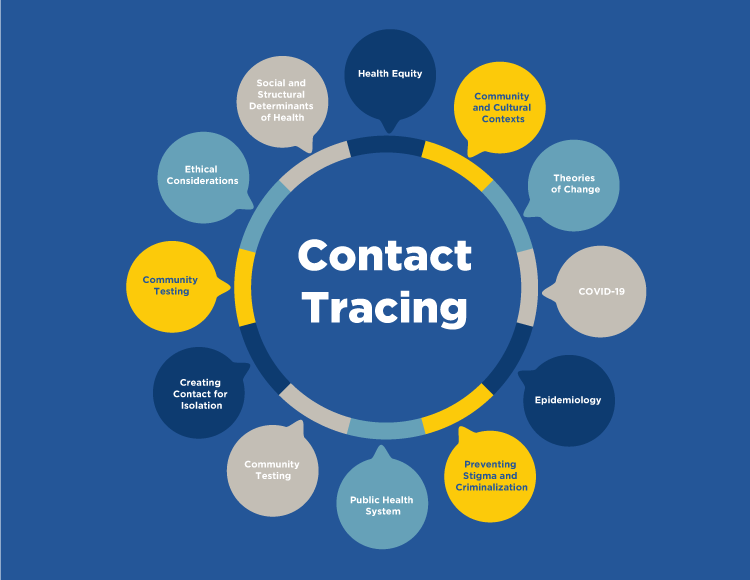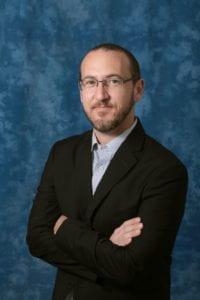Following the infection
UCI trains contact tracers to disrupt COVID-19 transmission – with an emphasis on health equity issues

Someone tests positive for COVID-19. Who have they been in contact with? Who else might they have infected?
Contact tracers are the health workers tasked with the detective-like role of figuring out the spread of a disease from one person to another through the community. And as the number of coronavirus cases swells, the need for trained tracers is rising.
To meet that need, UCI is holding a health equity contact tracing workshop series for 500-plus participants, including about 30 people from the Orange County Health Care Agency and over 150 UCI students.

“This [workshop] is about more than simply teaching a skill. This is education as a public health intervention. If we do this right, we could have an impact on our epidemic and more,” says Daniel Parker, a UCI assistant professor of public health who helped design the curriculum. “Orange County has less than 200 contact tracers currently, and we need anywhere from 500 to 900 or more depending on the severity of outbreaks.”
Over the course of four weeks, starting July 20, participants will learn some basic epidemiology, conduct role-playing exercises, and discuss what it’s like to do the face-to-face work of contact tracing. The workshop will be held remotely, per physical distancing guidelines, and successful trainees will receive a certificate of completion.
The information that contact tracers need isn’t complicated: who a person was with and when, plus the timing of any symptoms. But the practice isn’t just about making phone calls and asking questions.
To be truly effective, contact tracers need to work alongside people who live in areas experiencing disproportionate COVID-19 impacts. UCI is preparing them for that by partnering with community-based organizations to ensure that they approach their task through a health equity lens. The workshop is focusing on training contact tracers who speak Spanish and can serve hard-hit Latino neighborhoods in Orange County – including many where UCI students live.
“The people who are more affected need food, and they can’t stay home because they need to work,” says America Bracho, executive director of Latino Health Access, one of the groups UCI is partnering with for the workshop. “We believe we absolutely need to have an equity lens in every aspect of how we respond to the pandemic. The role of UCI is increasingly deep at all levels – working with us, working with youth, working with stakeholders. We are thrilled with how well we’re working together.”
Early in the pandemic, COVID-19 afflicted high-income people who traveled, but it has since rippled across all socioeconomic levels. Low-income people have been hit especially hard, since they are often front-line workers.

Courtesy of UCI’s Program in Public Health
“There are major social and economic injustices that communities of color, many of which are low-income, have long navigated, that shape their health outcomes,” says Alana LeBrón, UCI assistant professor of public health and Chicano/Latino studies. “The data show that COVID-19 has really affected low-income communities of color, both in Orange County and elsewhere.”
Contact tracers inform people about their possible exposure to the coronavirus, recommend testing, and ask them to quarantine or isolate to prevent further spread of the disease. But individuals potentially infected need to have the means and conditions to be able to do that – including assurance that their financial needs will be met and they’ll retain job security.
“Without attending to everything that follows alerting someone to their possible exposure, then it’s bound to fail,” says LeBrón, who helped develop the workshop. “It’s really a humanistic, one-to-one approach that’s needed.”
Lags in both COVID-19 testing and data transfer in California are currently slowing contact tracing efforts, however. Test results can be delayed for over a week, and then reported cases may take another week to wind up in the data system that county public health workers are using, Parker says. This means that an infected person can infect other people – and those people can infect even more people – before contact tracers are even aware of the first case.
“If contact tracing is going to be a strong component of Orange County’s COVID-19 response – and it should be – we really need a system that allows contact tracers to reach potentially infected people in a timely manner,” Parker says. “But the current system doesn’t allow us to trace infections quick enough. And that’s unacceptable.”
The workshop series at UCI will teach a manual contact tracing method that builds on local partnerships to equip trusted community members to play the role of contact tracers where they live and work. It aims to empower the Black, Latino, Asian American, Pacific Islander, immigrant and indigenous groups that have been disproportionately affected by COVID-19.
“We really want to help reshape the narrative around the causes of COVID-19 and the strategies to address it. This is about a proactive, community-driven effort to achieve health through racial equity,” says Abigail Reyes, the director of UCI community resilience projects, who’s helping to coordinate the effort. “Workshop participants will come away with a greater capacity as organizers and responders.”